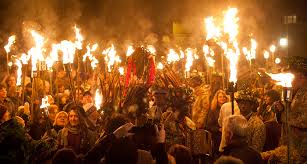The Pagans are Back
Jews are joining Christians in panic over the growth of Paganism. The U.S. military recently recognized Paganism as an official religion to be served by the Chaplain Corps. I've covered here a while back the growing numbers of Pagans in the Norse countries.
The growth of a tiny group such as Pagans would be of little interest were it not for the thousands of years variations of this belief system dominated parts of the world. From what little I understand about the faith it seems to fit perfectly the notion of a god or gods. That is to say, from what we know, there are no gods other than those which live in our minds. Individuals thinks in millions of different ways, especially about religion. A different god is needed by each individual. Pagans worship a wide variety of gods so this helps each person get the one he/she needs.
In the past couple of years, Pope Francis has approved a dozen or more new saints. I recall Pope Benedict wanted more saints than were being approved during his tenure. Is a new saint a new god?
I looked up "Catholic saints" to learn what the term meant. Among other things the source said prayers to saints, "is considered efficacious." I had to look up "efficacious." It means something similar to the word "effective." Maybe the source, then, meant prayers to saints is considered effective.
While I assume Catholics would not agree saints are little gods, it is hard for me to tell the difference. Why would something one prays to not be a god?
That Catholic saints are gods matches up perfectly with Paganism. There were, and I suppose still are, local gods as well as broader ones. It makes economic sense for Popes to increase constantly the number of approved saints. IF each person needing a saint god is able to find one that fits him/her, we more Catholics. It's good business.
I don't know of Protestant denominations which have saints. Of course, one can be religious, Christian or otherwise, and worship saints. Saints may could compete with Pagan gods.




This comment has been removed by the author.
ReplyDeletetsm -- Usually when you write it sounds like you are copying from a right wing or Catholic source. On the few occasions when you revealed your source it always has been such places.
DeleteIn this case you drop in the word "culture." To say paganism reflected ancient cultures is no doubt correct. That is, the ancient pagans worshipped deities which only existed in their minds but who agreed with cultural values of the time. You may not realize it but you are also describing Catholicism to a "t." It took hold and remains because various cultures created it and maintain it.
You are wrong when you claim current culture cannot replicate Paganism. There is a good summary, probably better than your source, in Wikipedia. What I think we are in the midst of is a cultural change that lays the groundwork for something that might be called "paganism." It will not resemble the ancient versions but will qualify using one of those included in Wikipedia. There never was a "Pagan religion," it was a term invented by early Christians referring to the vast array of religious practices at the time. A vast array of beliefs and practices, as well as no beliefs, is well on its way and growing. Twenty per cent of the U.S. polls as "nones." The cultural shift is away from Christianity.
https://en.wikipedia.org/wiki/Paganism#Definition
This comment has been removed by the author.
ReplyDeleteThis comment has been removed by the author.
ReplyDeleteAccording to the linked article, prior to their competition with Christianity, pagans;
ReplyDelete“had no tradition of discourse about ritual or religious matters (apart from philosophical debate or antiquarian treatise), no organized system of beliefs to which they were asked to commit themselves, no authority-structure peculiar to the religious area, above all no commitment to a particular group of people or set of ideas other than their family and political context.”
Paganism was at the intersection of religious freedom and freedom from religion. Free to create god(s) in the image of one’s own ideals. Free to be godless.